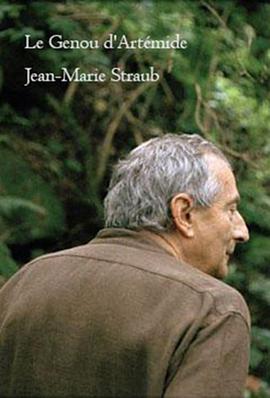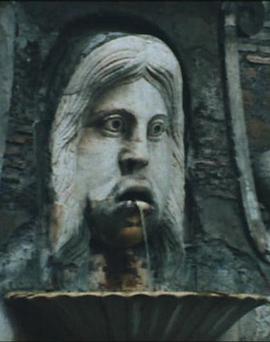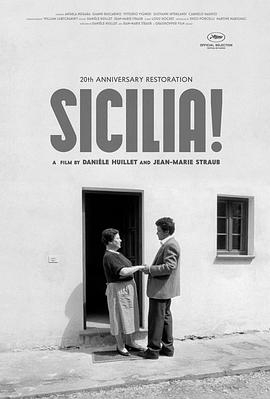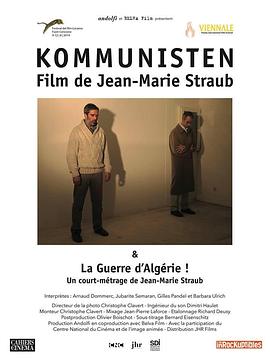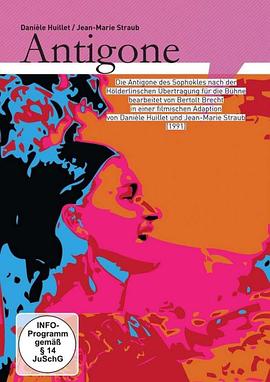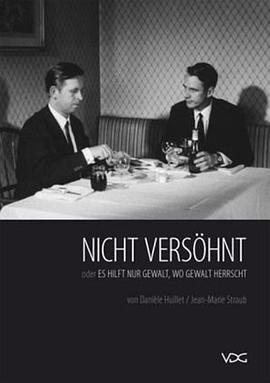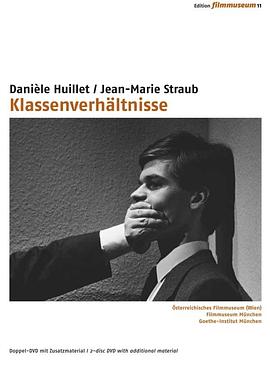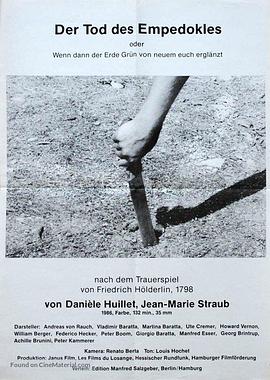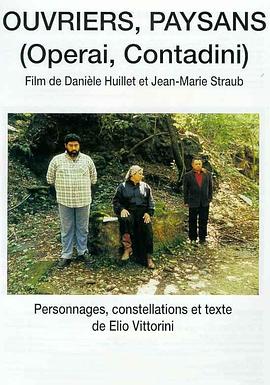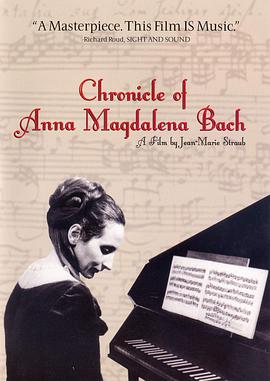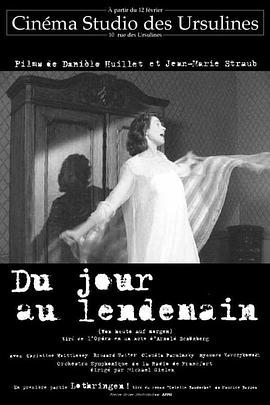让-马里·斯特劳
搜索"让-马里·斯特劳",找到11部影视作品
导演:
/让-马里·斯特劳布
主演:
剧情:
For Le Genou d'Artemide Jean-Marie Straub once again chose a dialogue by Cesare Pavese. And not just any dialogue, but one that tears open a painful, mystical abyss between love and the one left behind. The film is one single exhilaration and one single rush, a spell and dispersion into nature. It rises from a dark screen and chant to disappear in the woods with the whisper of the wind. It has little to do with what is generally called «cinema». It has one foot in the world beyond. Nature has ten million times the imagination of the most imaginative of artists. (Jean-Marie Straub)
导演:
/达尼埃尔·于伊耶,让-马里·斯特劳布
主演:
剧情:
一如他曾把卡夫卡小說幾乎「抽象」化,也把巴哈女士日記拍得如此地貼近音樂而非文字,Straub的這種風格,除了執拗地延續像MoulletGarrel這些新浪潮好友的「極簡」手法之外,也算是為自己的「藝術」捍衛的極高體現。 看來,我還得回頭去看一下Pedro Costa為「我們時代的電影」系列,為這兩夫妻拍的那一集吧,或許,我才真正能向他們更靠近一些(到底是Costa像他們而找他拍,還是Costa本身確實受到兩夫妻的影響,而得到真髓,所以找來對他們最有研究的創作者來拍呢?這我們就不得而知了)?
导演:
/让-马里·斯特劳布
主演:
剧情:
81-year-old master, Jean-Marie Straub, once again invents and surprises with his latest film. Kommunisten consists of six parts, five of which have been taken from his earlier works. Straub does not aim to be self-reverential, but instead wants to make different blocks (of text, time, and languages) clash so as to highlight invisible elements of feelings and politics. It is a film about human adventure, from the past century to the one ahead. In this project, all the things that the films of Jean-Marie Straub and Danièle Huillet have been based on for the past fifty years, find their most raw and recent form.
导演:
/达尼埃尔·于伊耶,让-马里·斯特劳布
主演:
剧情:
法国导演情侣组合斯特劳布-于伊耶与1991年将索福克勒斯的希腊悲剧《安提戈涅》搬上银幕,文本上采用了德国浪漫主义诗人荷尔德林的著名翻译,版本上则依照布莱希特40年代的改编,拍摄地点是西西里岛上塞杰斯塔的一座古罗马剧院遗址,拍摄时阳光明媚。影片背后文本的多层厚度赋予了本片以极强的现时性:就在拍摄当年的夏天,美军对伊拉克发起了第一轮进攻。这是一部关于教育公民不服从的作品。
导演:
/让-马里·斯特劳布,达尼埃尔·于伊耶
主演:
剧情:
The subtitle of Jean-Marie Straub and Danièle Huillet’s first feature, from 1965, “Only Violence Helps Where Violence Reigns,” suggests the fierce political program evoked by their rigorous aesthetic. The pretext of the film, set in Cologne, is Heinrich Böll’s novel “Billiards at Half Past Nine,” which they strip down to a handful of stark events and film with a confrontational angularity akin to Bartók’s music that adorns the soundtrack. The subtlest of cues accompany the story’s complex flashbacks. The middle-aged Robert Fähmel tells a young hotel bellhop of persecutions under the Third Reich; his elderly father, Heinrich, an architect famed for a local abbey, recalls the militarism of the First World War, when his wife, Johanna, incurred trouble for insulting the Kaiser. A third-generation Fähmel is considering architecture, just as the exiled brother of Robert’s late wife, returns, only to be met by their former torturer, now a West German official taking part in a celebratory parade of war veterans. Straub and Huillet make the layers of history live in the present tense, which they judge severely. The tamped-down acting and the spare, tense visual rhetoric suggest a state of moral crisis as well as the response—as much in style as in substance—that it demands.
导演:
/达尼埃尔·于伊耶,让-马里·斯特劳布
主演:
剧情:
改编自卡夫卡未完成的长篇小说《美国》,但其关注的并非真实的美国,更像是没有详细年代的关于美国的寓言。卡尔•罗斯曼由于丑闻而接受其舅舅的邀请搬去美国,然而他无法摆脱欧洲大陆旧式习惯,更糟的是,欧洲的阶级结构无法让他通过自己的双手谋生。这一电影版关注资本主义社会创造的残酷而变幻莫测的阶级关系。同时忠于原著而未添加影片的结局。施特劳布夫妇风格的一贯操作与卡夫卡氛围的完美结合:中景固定机位,面无表情的演员,人物肢体和语言刻意僵硬,强调侧面特写,镜头推进及平移刻意突兀。由此我们可以寻求到改编卡夫卡作品的带实验性的可能。
导演:
/达尼埃尔·于伊耶,让-马里·斯特劳布
主演:
剧情:
The subject of Danièle Huillet and Jean-Marie Straub’s Der Tod des Empedokles (The Death of Empedocles, 1987) is the Greek pre-Socratic philosopher Empedocles (c. 490 BC – 430 BC), who lived in the Greek colony of Agrigentum in Sicily. His theories are mentioned in several of Plato’s dialogues. He maintained that all matter is made up of four irreducible elements: water, earth, air and fire. A mystic and a poet, he is considered to be the founder of classical rhetoric. He is also thought to be the last Greek philosopher to write in verse; two fragments of his works survive: Katharmoi (Purifications) and Peri Phuseôs (On Nature). An advocate of democracy, he came into conflict with his fellow citizens of Agrigentum and, as result, was banished with his young disciple, Pausanius. When he was asked to return, he preferred to commit suicide by throwing himself into the active volcano at Mount Aetna. The German writer Friedrich Hölderlin wrote two versions of Der Tod des Empedokles in 1798 and 1800, and a final third version in 1820, all three ultimately unfinished. They were conceived as five-act tragedies and all three differ in plot. According to Michael Hamburger, Hölderlin’s English-language translator, the main reason why Hölderlin finished no version of the play must be that he remained too closely identified with Empedocles, at the very period in his life when his own view of the poet as philosopher, prophet and priest – and as tragic hero – was subject to perpetual crisis and re-examination. Huillet-Straub’s The Death of Empedocles is based on Hölderlin’s first version (the longest of the three), whereas Black Sin is based on the third version.
导演:
/达尼埃尔·于伊耶,让-马里·斯特劳布
主演:
/内详
剧情:
"Veteran experimental filmmakers Danielle Huillet and Jean-Marie Straub helmed this unusual adaptation of a novel by Elio Vittorini. Focused on the triumphs and failures of a group of laborers and farm hands who pooled their resources to operate an alternative collective farm after the end of World War II, Operai, Contadini features a cast of 12 actors who read aloud from Vittorini's book for the duration of the film, either reciting from memory or using a clearly visible script. Hardly designed to be a crowd pleaser, Operai, Contadini proved to be controversial among the audiences for its showings at the 2001 Cannes Film Festival, where it was screened as part of the Directors' Fortnight series." ~ Mark Deming, All Movie Guide "The group makes up a primitive community which seeks to erase not only the distress created by the war but also the hardships of life and hunger, and to protect them from violence, misery and fear. Amid the ruins of this post-war period, the characters build and invent a rapport both in their professional and daily lives between themselves, the sexes, generations, diverse social and geographical origins, and antagonistic political camps. The group maintains a 'register', a kind of diary, as if it were entering the minutes of an inquiry or a trial." -Steve Grayson "my favorite Straub-Huillet films are Too Early, Too Late and Operai, contadini (2001), both color landscape films with especially acute senses of place as well as of nature in all its harsh beauty." - Jonathan Rosenbaum
导演:
/达尼埃尔·于伊耶,让-马里·斯特劳布
主演:
剧情:
影片拍摄于1967年,是至今为止关于伟大的音乐家巴赫最优秀的影片,片名来源于英国作家同名小说,片中引用的对话、信件都取自巴赫生前的真实文件档案。影片几乎汇集了当时音乐演奏界的精英,如哈侬考特、奥古斯特·温钦格等,具有非常高的史料价值。与我们平日看到肖像画上胖而结实的巴赫完全不同,由著名钢琴演奏家和指挥家古斯塔夫·莱昂哈扮演的巴赫显得瘦小文弱。影片问世后得到了当时影评界的激赏。
导演:
/达尼埃尔·于伊耶,让-马里·斯特劳布
主演:
/内详
剧情:
Based on an unknown Schönberg opera from 1929, From Today Until Tomorrow explores one night in a not-quite loveless marriage. A husband and wife return from a party where she has flirted with another man, while he has cast an appraising eye toward an attractive, fashionably dressed acquaintance of his wife’s. Though each dreams, briefly, of leaving the marriage for the excitement and mystery of a new lover, in the end they decide stability and comfort are more important than the fleeting thrill of new romance. Directors Jean-Marie Straub and Danièle Huillet, who previously collaborated on two other films about music (The Chronicle of Anna Magdalena Bach, 1968, and Moses and Aaron, 1975), rely on long fixed shots in austere black-and-white so that the focus remains on the musical brilliance of Schönberg’s atonal score, performed here by 70 musicians. That Schönberg would choose such a relatively lighthearted message for his newly discovered musical language remains a mystery, especially since the conclusion reached by the husband and wife—to stick with the tried and true—seems directly at odds with Schönberg’s own philosophy of composing. It is just this juxtaposition, however, coupled with Straub and Huillet’s faithful presentation, that makes the opera a compelling addition to the Schönberg canon—and the film such a challenging and intriguing experience.

